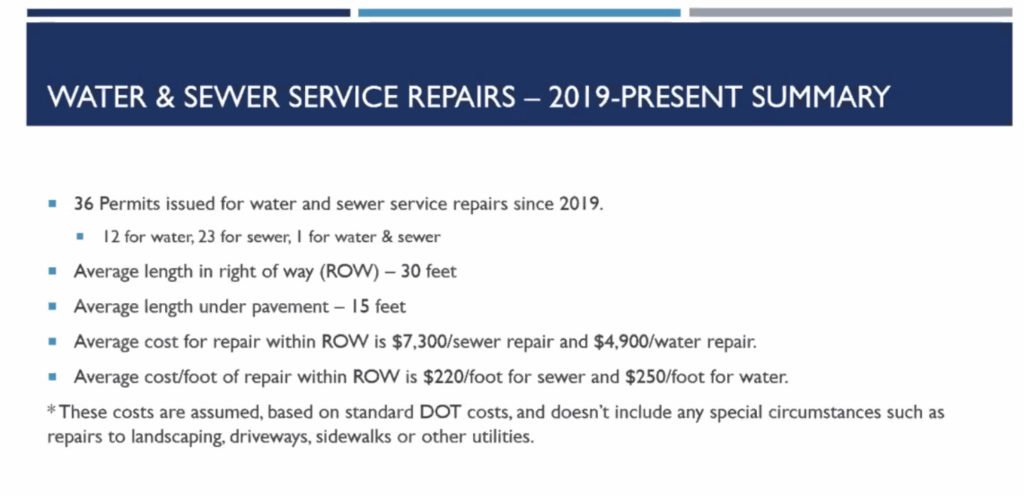New Sewer Bylaw Will Determine Who Pays For Water Line Repairs

Photo: The Pipe Doctor. Creative Commons
Report On The Meeting Of The Town Services And Outreach Committee, April 7,2022
Present: Dorothy Pam (Chair, District 3), Anika Lopes (District 4) , Ana Devlin-Gauthier (District 5) , Shalini Bahl-Milne (District 5), Andy Steinberg (at large).
Staff: Town Manager Paul Bockelman, Superintendent of Public Works Guilford Mooring, Assistant Superintendent of Public Works Amy Rusiecki, Clerk of the Council Athena O’Keeffe
Also: Town Councilor Pam Rooney (District 4), one of the sponsors of the rental by law.
A scheduled report from the town’s Community Participation Officers was postponed until a future meeting.
Public Comment
Shalini Bahl-Milne asked that public comment be moved to the beginning of the meeting (it is usually the last item on the agenda), and there were no objections.
Rosemary Kofler, representing Friends of the Amherst Senior Center, spoke of the many challenges that the Amherst Senior Center faces in meeting the needs of Amherst seniors. She pointed out that the center lacks sufficient space for all of its activities, especially classroom space which is now shared with the health department vaccine clinics and the Musante Health Center. She noted that State Representative Mindy Domb has earmarked funds for exercise equipment for the center but it cannot be purchased because there is currently no place to put it. She noted that the center is a second home for many of Amherst’s 5,300+ seniors, and referred to a letter that Friends of The Amherst Senior Center sent to town councilors, outlining the need for more space and staffing and a larger budget. She pointed out that several comments on the ongoing town senior survey complained that the town is not concerned with the needs of its senior residents. She asked the Town Services and Outreach Committee (TSO) to look into what might be done.
Later in the meeting, TSO agreed to take in the near future the concerns that Kofler raised..
Elsie Fetterman – spoke of her concern that current rules for water line repairs, the responsibility for which now fall on the individual property owner, place an unfair and a possibly unbearable burden on some property owners. She said that she recently needed to make repairs to a waterline somewhere between the main and her house with a resulting cost of $18,000. She noted that other towns take responsibility for water line repairs and asked TSO to consider transferring liability for water line repairs to the town in their formulation of new water and sewer bylaws.
Water And Sewer Bylaw
Superintendent of Public Works Guilford Mooring suggested that the primary decision that needs to be made in developing a new sewer bylaw is who will own water and sewer service lines, and who will be responsible for repairs. He outlined three options.
- Town owns water mains and sewer mains only. Property owners are responsible for repairs to their water service line out to the water and sewer mains in the roadway. This is the town’s current practice.
- Town is responsible for repairs to the service within the town right of way – that is, between the property line and the water/sewer mains in the roadway. Property owners are responsible for repairs to their service lines between the house/building and the property line.
- Town is responsible for repairs to the service line from the house/building to the water/sewer mains in the roadway.
In framing the new bylaw, the council must decide whether the town will continue to do things as they are now doing them or adopt a new framework. Each of these options poses its own set of challenges and costs. After considerable discussion of the different options, TSO agreed to collect more information and continue the discussion at their next meeting.
The committee spent some time reviewing draft language for new sewer regulations and new water regulations.
Discussion
Dorothy Pam asked if there were other options besides the three outlined by Mooring. She noted that when she had to undertake expensive repairs for the waterline at her home, that she had insurance to cover the expense. She asked whether the town could take out such insurance or make it available to homeowners.
Bockelman responded that the town has scheduled a meeting with a company that provides that kind of insurance. Bockelman envisions that this would be private insurance that the homeowner could buy at their own discretion. The town is looking into facilitating that availability.
Bahl-Milne asked how other towns are handling these complexities
Mooring responded that many communities do what we do, that is, pass the responsibility for repairs beyond the mains on to the homeowner. But the three options outlined above are also used in many towns. Springfield is responsible for repairs from the main to the meter inside the house. Northampton used to have the same rule as Amherst, although this might have changed recently. Mooring provided the anticipated the costs to the town if the town were to assume responsibility for all water line repairs (see below), but warned that these are very rough ballpark numbers. He said that if the town were to assume this liability they would need to be proactive about undertaking repairs. With roughly 6000 accounts in town, he estimated that the town would need to undertake about 200 proactive repairs/year to stay on top of things. Estimates of costs of such repairs based on past repairs are represented in teh table below.

Ana Devlin-Gauthier wondered whether one of the advantages of having the town be responsible for repairs up to property line is that the town would then undertake proactive repairs. She asked, “If we went this way would the DPW have the staff to do this?”
Mooring responded that the DPW does not currently have the staff to take this on and would need to add more staff or contract the work out (which would likely increase the cost of the work). He added that the town probably couldn’t hire all of the people it needs in order to be responsible for repairs up to the property line, even if it wanted to, because of current workforce shortages and that we would probably have to rely on contractors to pull us through during the phase-in period.
Asked what he thinks is the best way for the town to go, Mooring said that this is a judgment about what kinds of services the town wants to and is able to provide to its residents. “What level of service do you want to have as a community?” he asked. “ It’s up to the council to decide which way you want to go.”
Residential Rental Bylaw
TSO continued to debate the proposed temporary fee structure for rental permit fees.
The discussion revolved around whether the proposed fees were fair, whether there should be a differential rate based on building size, and whether such fees would likely be passed on to renters, creating an undesirable impact on those who could least afford it. The arguments largely repeated those that had been raised at the previous meeting. For a memo summarizing the proposal and the rationale of the sponsors look here. For a chart comparing rental fee permitting fees in different municipalities, look here.
TSO reached no conclusions and agreed to collect more information and to continue the discussion at their next meeting.
Councilor Pam Rooney, one of the four sponsors of the revised bylaw, reminded TSO that there is currently insufficient staffing and budgeted funds to do inspections of rental properties and that inspections in Amherst are complaint driven. She said that the sponsors are aware of inequities in the current system and are trying to address this. As noted at the previous meeting by both Rooney and Building Commissioner Rob Morra, this revision to fees is a temporary measure designed to set the table for more substantial changes to come including using permit fees to fund a more robust inspection system. Right now, the fee is meant to be a permit processing fee,so for the time being, the dollars charged for service are equitable. The fees will be revised again if and when the fees begin to address inspections.
Bahl-Milne continued to object to the proposed fee structure, arguing that it puts an inequitable burden on the owners of smaller properties. She asserted that larger units have a greater probability of being problematic (although Morra, at the previous meeting, said that town data show the opposite is true, that is, smaller rental properties generate the most complaints), so it makes no sense to her for us to charge the same fees for small and large properties. She offered the example of Barnsatable which apparently charges by the number of units.
Devlin-Gauthier responded that a greater charge for larger properites would not be commensurate with the service provided, that the fee is simply a filing fee.
Rooney explained that, in Amherst, the service provided is the filing of the permit,and the work is the same for large and small buildings.
Steinberg added that the town can’t charge fees for services that are not being provided. If this was about inspections it would be another story, but we’re not there yet, he said.
Rooney reminded Bahl-Milne that this is a temporary measure and that her concerns would be dealt with as the bylaw is developed. Bahl-Milne asked that someone look into Barnstable and why they are able to have a differential fee structure. “Why can’t we charge a registration fee per unit like Barnstable does?” she asked.
Anika Lopes again asked TSO to consider the trickle down effect of raising permit fees and its impact on renters.
Pam suggested that one possible way to build equity into the permit system after inspection fees are incorporated is to inspect houses for which there have been no complaints less frequently and hence charge smaller fees for those properties.

3 thoughts on “New Sewer Bylaw Will Determine Who Pays For Water Line Repairs”